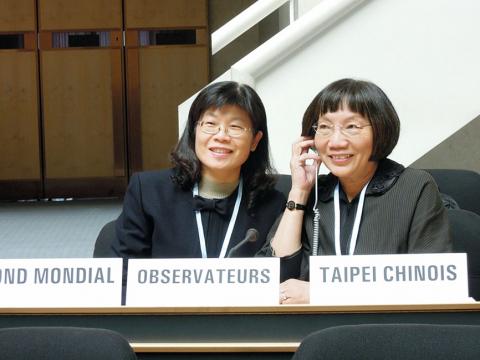Taiwan Solidarity Union (TSU) and Chinese Nationalist Party (KMT) legislators attending the World Health Assembly’s annual summit in Geneva yesterday criticized references by President Ma Ying-jeou (馬英九) to “one country, two areas” (一國兩區) made during his inaugural address on Sunday and said Taiwan should be able to join the WHO under its own name.
The Taipei Economic and Cultural Office in Geneva held a cocktail party in honor of Ma’s inauguration that was attended by the ministers of health from at least 12 countries with which Taiwan has diplomatic ties.
During the party, TSU Legislator Lin Shih-chia (林世嘉) thanked the representatives for their nations’ longtime support of Taiwan and expressed Taiwan’s willingness to bolster global health improvement initiatives.

Photo: CNA
“I wish to remind everyone that Taiwan is not a part of China; Taiwan is Taiwan, it is not China. According to UN Resolution 2758 of 1971, Beijing is the only legal representative of China in the UN; there is no “one country, two areas,” she said in her speech.
“Taiwan is a sovereign, independent country, and the only way to join the WHO is to join under the name of Taiwan, and I think all here agree with me,” she said.
KMT Legislator Su Ching-chuan (蘇清泉) confirmed his support for the idea, saying that while he and Lin were from different political parties, “we share the same opinion” on the issue, adding a call for all diplomatic allies present to continue to support Taiwan’s endeavors to not only join the WHO as a full member, but also participate more dynamically in international organizations.
The speech elicited a frank statement from the minister of health from the Republic of Nauru, who said that although his comment was likely to “offend” some people, the truth is that Taiwan is a sovereign, independent country and should therefore be able to participate in the WHO as a full member.
Meanwhile, in an international telephone interview, Lin told reporters from Taiwan that Ma’s mention of “one country, two areas” in his inaugural address and definition of “one China,” the Republic of China (ROC), was not only not recognized in international diplomatic circles, but would also ensure that Taiwan would never be able to join the WHO or the UN.
Instead, comments like that would only let the international community mistakenly think that the Taiwanese government accepts China’s “one China” framework and that Taiwan is only an area under China, Lin said.
She added that such misconceptions would only undermine Taiwan’s claims of sovereignty and lessen the opportunities in which Taiwan can participate in the international community.
Lin said that it was only by focusing on its objective of joining the WHO and the UN as a member state that the name of Taiwan and its sovereignty would be safeguarded.
Translated by Jake Chung, Staff Writer

Aftershocks from a magnitude 6.2 earthquake that struck off Yilan County at 3:45pm yesterday could reach a magnitude of 5 to 5.5, the Central Weather Administration (CWA) said. Seismological Center technical officer Chiu Chun-ta (邱俊達) told a news conference that the epicenter of the temblor was more than 100km from Taiwan. Although predicted to measure between magnitude 5 and 5.5, the aftershocks would reach an intensity of 1 on Taiwan’s 7-tier scale, which gauges the actual effect of an earthquake, he said. The earthquake lasted longer in Taipei because the city is in a basin, he said. The quake’s epicenter was about 128.9km east-southeast

GENSLER SURVEY: ‘Economic infrastructure is not enough. A city needs to inspire pride, offer moments of joy and foster a sense of belonging,’ the company said Taipei was named the city with the “highest staying power” in the world by US-based design and architecture firm Gensler. The Taiwanese capital earned the top spot among 65 cities across six continents with 64 percent of Taipei respondents in a survey of 33,000 people saying they wanted to stay in the city. Rounding out the top five were Vietnam’s Ho Chi Minh City (61 percent), Singapore (59 percent), Sydney (58 percent) and Berlin (51 percent). Sixth to 10th place went to Monterrey, Mexico; Munich, Germany; Sao Paulo, Brazil; Vancouver; and Seoul. Cities in the US were ranked separately, with Minneapolis first at

The New Taipei City Government today warned about the often-overlooked dangers of playing in water, and recommended safe swimming destinations to cool off from the summer heat. The following locations in the city as safe and fun for those looking to enjoy the water: Chienshuiwan (淺水灣), Baishawan (白沙灣), Jhongjiao Bay (中角灣), Fulong Beach Resort (福隆海水浴場) and Sansia District’s (三峽) Dabao River (大豹溪), New Taipei City Tourism and Travel Department Director-General Yang Tsung-min (楊宗珉) said. Outdoor bodies of water have variables outside of human control, such as changing currents, differing elevations and environmental hazards, all of which can lead to accidents, Yang said. Sudden

Tropical Storm Podul has formed over waters north-northeast of Guam and is expected to approach the seas southeast of Taiwan next week, the Central Weather Administration (CWA) said today. The 11th Pacific storm of the year developed at 2am over waters about 2,660km east of Oluanpi (歐鑾鼻), Pingtung County — Taiwan's southernmost tip. It is projected to move westward and could have its most significant impact on Taiwan on Wednesday and Thursday next week, the CWA said. The agency did not rule out the possibility of issuing a sea warning at that time. According to the CWA's latest update, Podul is drifting west-northwest